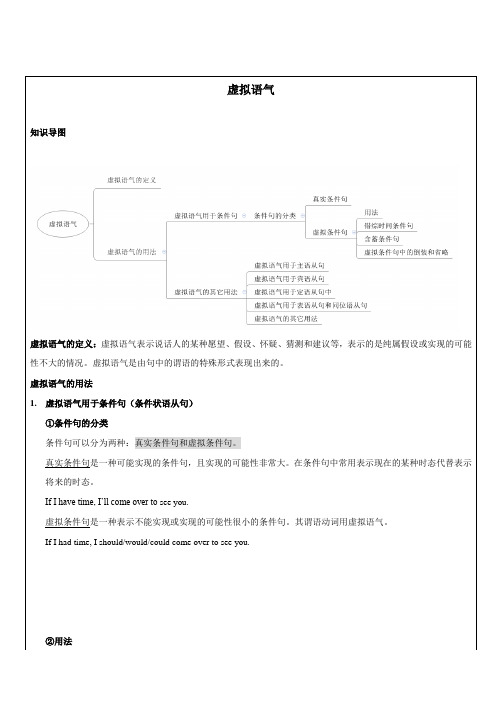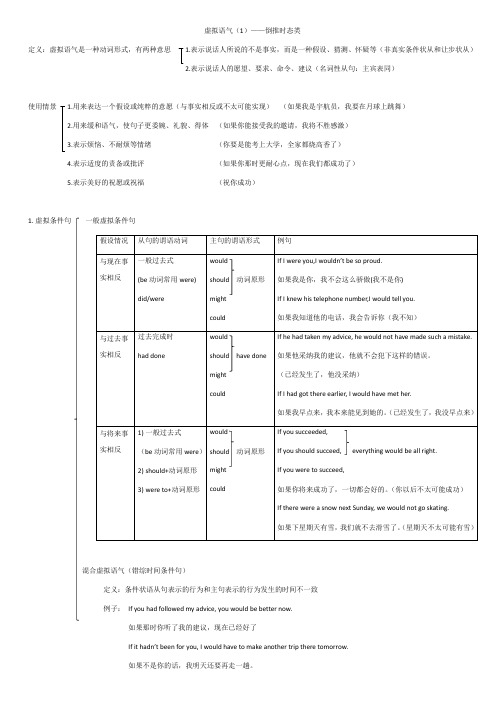高中英语虚拟语气小议专题辅导
高考英语虚拟语气专项讲解及练习.doc

高考英语虚拟语气专项讲解及练习高考英语虚拟语气专项讲解及练习概述:语气的定义和种类l、语气:语气是动词的一种形式,它表示说话人对某一行为或事情的看法和态度。
2、语气的种类:(1)陈述语气: 表示动作或状态是现实的、确定的或符合事实的,用于陈述句、疑问句和某些感叹句。
如:We are not ready. 我们没准备好。
What a fine day it is! 多好的天气啊!(2)祈使语气: 表示说话人的建议、请求、邀请、命令等。
如: Open the door, please。
请打开门。
(3)虚拟语气: 表示动作或状态不是客观存在的事实,而是说话人的主观愿望、假设或推测等。
如: If I were you, I should study English. 如果我是你,我就学英语了。
May you succeed! 祝您成功!一、虚拟语气虚拟语气用于表示所说的话与现在的事实相反,或与过去的事实相反,或与将来的事实相反。
表示说话人的主观愿望、猜想、建议或与事实不符的假设等,也可以表示可能性较小或不可能发生的情况。
虚拟语气一般用于正式的书面语中。
多用于复合句中。
虚拟语气是由谓语动词的特殊形式表达出来的。
w If they invite me this evening, I shall go with them. (陈述语气,说话人认为被邀请的可能性很大)w If they invited me this evening, I should go with them. (虚拟语气,说话人认为被邀请的可能性小或者根本不可能)二、虚拟语气在条件从句中的用法条件句有两类,一类是真实条件句,一类是虚拟条件句。
如果假设的情况是有可能发生的,就是真实条件句。
在这种真实条件句中的谓语用陈述语气。
w If it doesnt rain tomorrow, we will go to the park. 如果明天不下雨,我们就去公园。
高中英语学习:高中英语--虚拟语气专题讲解(详细)

虚拟语气
知识导图
虚拟语气的定义:虚拟语气表示说话人的某种愿望、假设、怀疑、猜测和建议等,表示的是纯属假设或实现的可能性不大的情况。
虚拟语气是由句中的谓语的特殊形式表现出来的。
虚拟语气的用法
1.虚拟语气用于条件句(条件状语从句)
①条件句的分类
条件句可以分为两种:真实条件句和虚拟条件句。
真实条件句是一种可能实现的条件句,且实现的可能性非常大。
在条件句中常用表示现在的某种时态代替表示将来的时态。
If I have time, I’ll come over to see you.
虚拟条件句是一种表示不能实现或实现的可能性很小的条件句。
其谓语动词用虚拟语气。
If I had time, I should/would/could come over to see you.
②用法
全国高中英语教师资料群190624773,该群全国规模最大、氛围最浓、资源超过30TB,旨在便于高英老师结交同仁交流成长、教学探究资源共享,共同提高行业水平另外群内持续更新优质教学和复习资料;欢迎优秀同行进群,让教学更轻松!让课堂更高效!。
高中英语语法一对一专项辅导讲义:虚拟语气

锐思教育学科教师辅导讲义表示与现在或将来的事实相反,主句用“would (should, could, might)+动词原形”;表示与过去的事实相反,主句用“would (should, could, might)+have+过去分词”;①用with, without, but for, in case of, supposing, otherwise, or等代替条件状语从句。
Without /But for your help, I wouldn’t have passed the test.= If you hadn’t helped me, I wouldn’t have passed the test. 没有你的帮助,我不会通过那次考试。
He was not present, otherwise, he would have helped us. 他当时不在,否则他会帮我们的。
You should take an umbrella with you in case of the rain. 你应该带把雨伞以防下雨。
Supposing he does not come, should we go without him? 他若不来,是不是就不带他去?②用分词短语代替条件状语从句。
Born in better times (= If he had been born in better times ), he would have been a scholar. 如果出生在好时代,他早就成为学者了。
Failing this time (= If you failed this time ), what would you do? 假如这次失败,那你怎么办?③用名词短语代替条件状语从句。
A few hours earlier (= If you had come a few hours earlier ), you would have been able to meet the famous writer.要是你早来几个小时,你就能见到这位著名的作家了。
高中英语之虚拟语气详细讲解

虚拟语气(1)——倒推时态类定义:虚拟语气是一种动词形式,有两种意思 1.表示说话人所说的不是事实,而是一种假设、猜测、怀疑等(非真实条件状从和让步状从)2.表示说话人的愿望、要求、命令、建议(名词性从句:主宾表同)使用情景 1.用来表达一个假设或纯粹的意愿(与事实相反或不太可能实现)(如果我是宇航员,我要在月球上跳舞)2.用来缓和语气,使句子更委婉、礼貌、得体(如果你能接受我的邀请,我将不胜感激)3.表示烦恼、不耐烦等情绪(你要是能考上大学,全家都烧高香了)4.表示适度的责备或批评(如果你那时更耐心点,现在我们都成功了)5.表示美好的祝愿或祝福(祝你成功)1.虚拟条件句一般虚拟条件句混合虚拟语气(错综时间条件句)定义:条件状语从句表示的行为和主句表示的行为发生的时间不一致例子:If you had followed my advice, you would be better now.如果那时你听了我的建议,现在已经好了If it hadn’t been for you, I would have to make another trip there tomorrow.如果不是你的话,我明天还要再走一趟。
If you had studied hard before,you would be a college student now.如果你以前努力学习的话,你现在就是大学生了。
省略+倒装当虚拟条件句的谓语动词中含有were,should,had时,if可以省略,并将were,should,had提前于句首,变为倒装句。
如果虚拟条件句是否定句,not 保留在原处If he should agree to go there, we should send him there.= Should he agree to go there,we should send him there.If she were there,she would agree with us.= Were she were, she would agree with us.If he had learnt about computers,we would have hired him.= Had he learnt about computers,we would have hired him.含蓄虚拟条件句定义:有时为了表达的需要,在虚拟语气中并不总是出现if引导的条件状语从句,而是通过其他手段来代替条件从句分类:1) but for....=(If it+be not for) ;without;Without your help ,we couldn’t have finished the work ahead of time.= But for your help,we couldn’t have finished the work ahead of time.= If it hadn’t been for your help,we couldn’t have finished the work ahead of time.没有你的帮助,我们不可能完成任务。
(完整word版)高中英语语法之虚拟语气讲解

【The Subjunctive Mood】语气(mood)是一种动词形式,用以表示说话者的意图或态度。
英语中的语气有三种:陈述语气、祈使语气和虚拟语气。
直陈语气(indicative mood),表示所说的话是事实。
祈使语气(imperative mood),表示所说的话是请求或命令。
虚拟语气(subjunctive mood),表示说的话不是事实,或者是不可能发生的情况,而是一种愿望、建议或与事实相反的假设等。
一. 虚拟语气在条件句中的应用学习虚拟语气在条件句中的用法之前我们必须清楚条件句的种类:条件句有真实条件句与非真实条件句(或称虚拟条件句)两种。
真实条件句所表的假设是可能发生或实现的,句中的条件从句与结果主句都用陈述语气。
如:If it doesn’t rain tomorrow, I will go for a picnic. 假若明天不下雨,我就去野餐。
Oil floats if you pour it on water. 你如把油倒在水里,油就浮起来。
虚拟条件句所表的假设则是不可能或不大可能发生或实现的,句中的条件从句与结果主句皆须用虚拟1. 与现在事实相反的虚拟条件句,条件从句的谓语用动词的过去式(be的过去式用were), 主句的谓语用should (would, might,could)+动词原形。
如:If it were not raining, we should go for a picnic.如果现在不下雨的话,我们就出去野餐了。
(事实是:天在下雨,我们不能出去野餐。
表示愿望。
)If he came here, he might be able to help you. 如果他来这,他就能够帮助你了。
(事实是:他没来这,他不可能帮助你。
表示对他的良好印象。
)2. 与过去事实相反的虚拟条件句,条件从句的谓语用had+过去分词,主句的谓语用should (would, might,could)+ have +过去分词。
虚拟语气 课件高考英语语法复习专题

与过去事实相反
过去完成时 had done
I would rather you _c_a_m__e_(come) here now. I would rather you _c_a_m__e_(come) here tomorrow.
I would rather you _h_a_d__n_’t_t_o_ld_ (not tell)me the truth yesterday.
宾语从句
14
(一). 宾语从句
我们建议Tom 去休息一下。 他坚持要我与他同行。 他们要求派Tom去那儿工作。 老师要求作业要及时完成。
We suggested _(_th__a_t)_T__o_m__h_a_v_e_a__r_e_st. He insisted _(t_h_a_t_)_I_(_s_h_o_u_ld__)_g_o__w_i_th__h_i_m_ . They requested (that) Tom _(_s_h_o_u_l_d_)_b_e_s_e_n_t_t_o_w__o_r_k_t_h_e_r_e_______ .
that不可省略
• It is suggested that we (should) practise reading English everyday.
16
这些动词相对应的名词性从句也用should do
(三).表语从句
• The / One’s insistence / order / command / suggestion / advice / proposal / recommendation / request / requirement / demand / desire is / was that … (should) do
高中英语 虚拟语气专题讲义
虚拟语气虚拟语气表示说话人的愿望、假设、猜测、建议,而不表示客观存在的事实。
它通过谓语动词的特殊形式来表示。
虚拟语气的主要内容:一、非真实条件句中的虚拟语气〔if 引导〕二、宾语从句中的虚拟语气三、主语从句中的虚拟语气四、表语从句、同位语从句的虚拟语气五、状语从句中的虚拟语气六、几种特殊的虚拟语气比较:If it rains tomorrow, the crops will be saved. 陈述语气If it rained tomorrow, the crops would be saved. 虚拟语气例如:1、如果我有一百万美元,我会买下这架飞机。
If I had one million dollars, I would buy the plane.2、如果我是你,我会再试一次。
If I were you, I would try it again.3、如果他努力学的话,他就通过这次考试。
If he had worked hard, he would have passed the examination.4、如果他明天来的话,我会告诉他这件事.If he came here tomorrow, I would tell him about it.学习虚拟条件句应注意以下几点:(1)省略if假设虚拟条件句中有were, had, should, 可以省略if, 并将were, had, should移到句首。
如:1. If I were to meet him tomorrow, I should ask him about it.——Were I to meet him tomorrow, …2. ____for the doctor’s careful treatment, he_____ till last year. CA. If it is not, can’t liveB. Were it not, couldn’t liveC. Had it not been, couldn’t have livedD. If they were not, couldn’t live(2) 错综时间虚拟条件句——虚拟条件句与主句谓语动词发生的时间有时不一致,要注意主从句谓语形式。
高中英语语法《虚拟语气》专题教案
高中英语语法《虚拟语气》专题教案一、动词的语气语气用来区别讲话人对某一行为或事情的看法和态度。
英语中的语气(mood有三种,分别是陈述语气、祈使语气和虚拟语气。
1.陈述语气陈述语气一般用来叙述事实或就事实提出询问,主要用于陈述句、疑问句和某些感叹句。
Where there is a will,there's a way.有志者事竟成。
Can you help me carry the box upst airs你能帮我把箱子搬到楼上吗?2.祈使语气祈使语气表示说话人向对方提出请求或下达命令。
Come this way,please!请这边走。
Don't make any noise,will you别吵,行吗?3.虚拟语气虚拟语气表示动作或状态不是客观存在的事实,而是说话人的主观愿望、假设或推测等。
If I were a bird,I could fly in the air.如果我是一只小鸟,我就能在空中飞行。
I wish it were spring all the year round.但愿四季如春。
二、条件句中的虚拟语气A.真实条件句表示的假设是可能发生或实现的,主句和从句的谓语动词都要用陈述语气。
If he doesn't come at 8,we won't wait for him.如果他八点不来,我们就不等他了。
We sh all go there unless it rains tomorrow.如果明天不下雨,我们将去那里。
I'll let you use my bike on condition that you keep it clean.如果你能保持车子干净,我就让你用我的自行车。
B.在含有非真实条件句的复合句中,主句和从句的谓语动词都要用虚拟语气,其构成有三种形式:与现在事实相反if条件句的谓语:were did主句的谓:would(couldshouldmight+do与过去事实相反if条件句的谓语:had done主句的谓:would(couldshouldmight+have done与将来事实相反if条件句的谓语:didwere主句的谓:should do would(couldshouldmight+do were to do1.表示与现在事实相反的条件条件从句用动词的过去式(be动词用were,主句用should(第一人称或would(全部人称+动词原形。
高中英语知识点归纳虚拟语气的特殊情况与考点
高中英语知识点归纳虚拟语气的特殊情况与考点高中英语知识点归纳——虚拟语气的特殊情况与考点虚拟语气是英语语法中的重要内容之一,也是高中英语中的重点考点之一。
虚拟语气用于表达与事实相反、不可能实现、非真实等情况。
在虚拟语气的用法中,有一些特殊情况需要特别注意。
本文将针对高中英语中虚拟语气的特殊情况进行详细归纳和解析。
一、与过去事实相反的虚拟语气1. 与过去事实相反的虚拟语气用来表示对现在的假设情况。
例如:If I were/had been there, I would help you.(如果我当时在那儿,我会帮你的。
)2. 与过去事实相反的虚拟语气用来表示对过去的假设情况。
例如:If I had studied harder, I would have passed the exam.(如果我学得更努力些,我就能通过那次考试。
)二、与现在事实相反的虚拟语气1. 与现在事实相反的虚拟语气用来表示对过去的假设情况。
例如:If I had known you were coming, I would have prepared a dinner.(如果我早知道你要来,我就准备晚餐了。
)2. 与现在事实相反的虚拟语气用来表示对将来的假设情况。
例如:If I were you, I would go to the party.(如果我是你,我会去参加那个聚会的。
)三、与无实际情况相反的虚拟语气1. 过去将来完成时过去将来完成时用来表示对过去某个时间点之前的动作或状态进行想象、猜测或假设。
例如:I thought he would have arrived by now.(我以为他现在应该已经到了。
)2. 过去完成进行时过去完成进行时用来表示对过去某个时间点之前一直在进行的动作或状态的推测。
例如:He looked tired. He had been working all day.(他看起来很疲惫。
他一直在工作一整天了。
高考英语中虚拟语气的用法和注意点是什么
高考英语中虚拟语气的用法和注意点是什么在高考英语中,虚拟语气是一个重要的语法点,也是让许多同学感到头疼的部分。
虚拟语气用于表达与事实相反、假设、愿望、建议等情况,它的用法多样,且有不少需要注意的地方。
接下来,咱们就详细地探讨一下高考英语中虚拟语气的用法和注意点。
一、虚拟语气在条件句中的用法1、与现在事实相反条件从句用一般过去时(be 动词用 were),主句用“would / could / should / might +动词原形”。
例如:If I were you, I would take the job (如果我是你,我会接受这份工作。
)2、与过去事实相反条件从句用过去完成时,主句用“would / could / should / might + have +过去分词”。
比如:If you had studied harder, you would have passed the exam (如果你学习更努力些,你就会通过考试了。
)3、与将来事实相反条件从句有三种形式:① should +动词原形;② were to +动词原形;③一般过去时。
主句用“wou ld / could / should / might +动词原形”。
举个例子:If it should rain tomorrow, we would stay at home (要是明天下雨,我们就待在家里。
)二、虚拟语气在宾语从句中的用法1、 wish 后的宾语从句表示与现在事实相反,用一般过去时;表示与过去事实相反,用过去完成时;表示与将来事实相反,用“would / could +动词原形”。
例如:I wish I were as tall as you (我希望我和你一样高。
)2、表示“建议、要求、命令”等动词后的宾语从句这类动词有suggest(建议)、advise(建议)、insist(坚持要求)、order(命令)、demand(要求)等,从句谓语用“should +动词原形”,should 可以省略。
- 1、下载文档前请自行甄别文档内容的完整性,平台不提供额外的编辑、内容补充、找答案等附加服务。
- 2、"仅部分预览"的文档,不可在线预览部分如存在完整性等问题,可反馈申请退款(可完整预览的文档不适用该条件!)。
- 3、如文档侵犯您的权益,请联系客服反馈,我们会尽快为您处理(人工客服工作时间:9:00-18:30)。
高中英语虚拟语气小议一、条件句中的虚拟语气虚拟条件句表示的是与现在事实、过去事实或将来事实相反的假设,实现的可能性极小或与事实相反。
This printer is of good quality. If it break down within the first year, we would repair it at our expense. (2020天津)A. wouldB. shouldC. couldD. might析:B。
根据前句中的is及主句的谓语动词would repair,可知是与将来事实相反的虚拟语气。
二、错综时间/混合虚拟语气当条件从句与结果主句所表示的时间不一致时,虚拟语气的形式应做相应的调整。
如:If they had started the early morning yesterday, they would be here now.如果他们昨天早上动身的话,他们现在就在这里了。
(从句表示过去,主句表示现在) 【真题回放】It is hard for me to imagine what I would be doing today if I in love, at the age of seven, with the Melinda Cox Library in my hometown.(2002上海)A. wouldn’t have fallenB. had not fallenC. should fallD. were to fall析:B。
根据would be doing today可知主句与现在事实相反。
根据at the age of seven可知if从句与过去事实相反,故用过去完成时。
三、虚拟条件从句的倒装和省略如果虚拟条件从句的谓语动词中含有were,had(助动词)或should,可以省略连词if,而把were,had或should放在主语前构成倒装。
如果条件从句是否定形式,倒装时只能把not放在主语的后面。
如:Were I Tom, I would refuse. 如果我是汤姆,我会拒绝。
Should you require anything, just give me a ring. 你要是需要什么就给我打个电话。
Had it not been for the doctor’s care, I should not be speaking to you now. 要是当时没有医生的治疗,我现在就不能对你讲话了。
【真题回放】What would have happened, , as far as the river bank? (2001上海)A. Bob had walked fartherB. if Bob should walk fartherC. had Bob walked fartherD. if Bob walked farther析:C。
句意:如果鲍勃走得更远些,远到河岸,会发生什么事?四、含蓄条件虚拟语气有时假设的情况并不以条件从句的形式表现出来,而暗含在上下文中,如可通过某些词语(without,otherwise,but,but for等)表现出来。
如:But for the English test, I would have gone home this week. 要不是有英语测试,我这个礼拜就回家了。
(but for短语暗示了条件)I would have written you before but I have been ill. 要不是病了,我早给你写信了。
Anybody else would have believed you. 要是换上别人早就信了你的话。
【真题回放】But for the help of my English teacher, I the first prize in the English Writing Competition.(2020福建)A. would not winB. would not have wonC. would winD. would have won析:B。
“英语作文比赛的一等奖”是既成事实,由此可知表示与过去事实相反,句子谓语动词用would/should/could/might + have done结构。
五、“(should)do型”虚拟语气(主要用在名词性从句中)1. 在表示建议、要求、命令等的宾语从句中,谓语动词用“(should)+动词原形”。
一个坚持(insist),两个命令(order,command),三个建议(suggest,advise,recommend),四个要求(ask,demand,request,require)。
2. suggest与insist后宾语从句中的虚拟语气与陈述语气用法比较。
Her face suggested (暗示) that she was ill. So I suggested (建议) that she (should) be sent to hospital immediately.Tom insisted (坚决要求) Mike (should) apologize to his teacher, but Mike insisted (坚持说;认为) that he was not wrong.【联想拓展】1. “(should) do型”虚拟名词性从句之间的转换(虚拟宾语从句、主语从句、表语从句、同位语从句之间的转换)。
I suggested that he (should) go there at once. (宾语从句)=I made a suggestion that he (should) go there at once. (同位语从句)=My suggestion was that he (should) go there at once. (表语从句)=It is suggested that he (should) go there at once. (主语从句)注:This is the suggestion that/which he made at the meeting. (定语从句,陈述语气)2. It is surprising (a pity,strange,important,a shame...) +that+主语+(should) do句型。
如:It is strange that he (should) have said so.It is necessary that we (should) keep the balance of nature.【真题回放】—Don’t you think it necessary that he to Miami but to New York?—I agree, but the problem is he has refused to.(2020江苏)A. will not be sent; thatB. not be sent; thatC. should not be sent; whatD. should not send; what解析:B。
第一空是that引导的宾语从句,由于有necessary作补足语,因此用虚拟语气(should) do的形式;第二空是that引导的表语从句。
另外:proposal,plan,idea等名词后的表语从句或同位语从句也用虚拟语气。
如:My idea is that we (should) have a picnic in the coming weekend. 我的意见是在周末来一次野炊。
六、特殊句式中的虚拟语气(It’s time that/ would rather/as if/as though /if only等)◆It be (about/high) time that后的从句,谓语动词用过去式或用“should+动词原形”。
◆①would rather sb. +动词过去式(与现在或将来事实相反)②would rather sb. +had+过去分词(与过去事实相反)◆(谓语)动词+as if/as though+从句中的虚拟语气(be常用were)①动词过去式(主从句同时)。
②had+过去分词(从句动作在主句之前)。
③could/might/would+动词原形(从句动作在主句之后)。
It looks as if he were 10 years younger today.It looks as if he hadn’t had a meal for a week.It looks as if he could live for another century.The man looked very worried, as if something would happen to him.注:as if/though引导的表语从句有时可用陈述语气。
◆在wish后面的宾语从句中的谓语动词要用虚拟语气。
谓语动词的形式为:与现在事实相反用动词过去式(be用were);与过去事实相反用过去完成时或could/would + have done;与将来事实相反用could/would/might+动词原形。
【真题回放】How I wish every family a large house with a beautiful garden! (2002上海春招)A. hasB. hadC. will haveD. had had◆if only常用在虚拟语气中表达愿望(If only +句子=I wish +从句)或是非真实的条件。
(偶尔用于真实条件句)。
